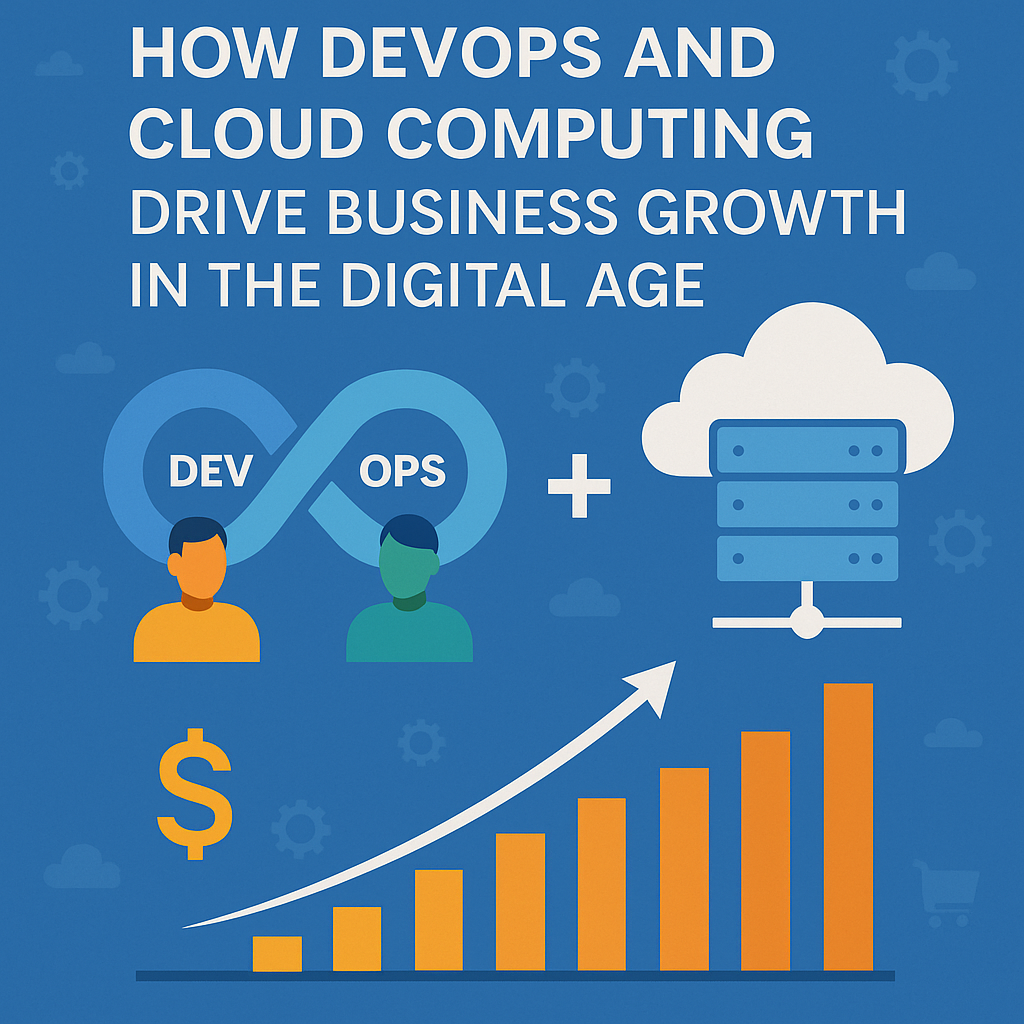In today’s fast-paced digital world, businesses must innovate rapidly to stay competitive. Two key technologies are making this possible: DevOps and Cloud Computing. When combined, they become a powerful force that helps businesses scale faster, reduce costs, and deliver exceptional value to customers.
In this blog, we’ll explore how DevOps and cloud computing work together and why they are critical drivers of modern business growth.
🚀 What is DevOps?
DevOps is a culture and set of practices that bridges the gap between development and operations teams. It emphasizes:
- Collaboration between developers and operations
- Automation of repetitive processes
- Continuous Integration and Continuous Delivery (CI/CD)
- Monitoring and feedback for continuous improvement
The typical DevOps lifecycle includes:
Plan → Develop → Build → Test → Release → Deploy → Operate → Monitor
Common DevOps tools include:
- CI/CD: GitHub Actions, Jenkins
- Containerization: Docker, Kubernetes
- Monitoring: Prometheus, Grafana
- Deployment Automation: ArgoCD, Helm
☁️ What is Cloud Computing?
Cloud computing allows businesses to access computing resources (servers, storage, databases, etc.) on-demand over the internet. It eliminates the need for expensive on-premises hardware and offers:
- Scalability: Instantly add or remove resources based on demand
- Cost-efficiency: Pay only for what you use
- High Availability: Run applications with minimal downtime
- Global Reach: Deploy services across multiple regions worldwide
Main cloud service models:
- IaaS (Infrastructure as a Service): AWS EC2, DigitalOcean Droplets
- PaaS (Platform as a Service): Google App Engine, Heroku
- SaaS (Software as a Service): Salesforce, Google Workspace
⚡ Why DevOps + Cloud Is a Game-Changer for Businesses
When DevOps and Cloud are used together, they deliver strategic benefits that transform businesses:
✅ 1. Faster Time-to-Market
CI/CD pipelines automate testing and deployments, reducing the time to release new features or products.
✅ 2. Reduced Operational Costs
Cloud infrastructure eliminates the need for hardware investment, and DevOps automation reduces human error and manual overhead.
✅ 3. Scalable and Resilient Systems
With Kubernetes, autoscaling, and container orchestration, your application adapts to demand in real-time—without service disruption.
✅ 4. Improved Team Collaboration
Shared development and staging environments in the cloud help teams test and collaborate in real time, accelerating innovation.
✅ 5. Greater Customer Satisfaction
Frequent and reliable updates mean better user experience, faster bug fixes, and continuous improvement.
📈 Real-World Use Cases
🛒 E-commerce
During sales or festive seasons, websites automatically scale up using cloud services like AWS Auto Scaling or DigitalOcean’s App Platform.
🚀 Startups
Cloud and DevOps allow startups to release Minimum Viable Products (MVPs) in weeks instead of months.
🏢 Enterprises
Large organizations use DevOps pipelines to deploy microservices-based applications across hybrid or multi-cloud environments.
🛠️ DevOps & Cloud Best Practices That Drive Business Value
- Infrastructure as Code (IaC): Use Terraform or Helm to manage and version cloud infrastructure.
- Automated Monitoring: Leverage Prometheus + Grafana for real-time health dashboards.
- Safe Deployments: Implement Blue-Green or Canary deployment strategies to reduce downtime.
- Multi-Cloud Strategy: Reduce vendor lock-in and improve fault tolerance by using multiple cloud providers.
🧭 How to Get Started
Starting your DevOps and Cloud journey doesn’t have to be overwhelming:
- Start Small: Set up CI/CD pipelines using GitHub Actions or GitLab CI.
- Choose a Cloud Platform: Start with AWS, Azure, GCP, or DigitalOcean based on your budget and needs.
- Adopt Containerization: Use Docker and Kubernetes for scalability and portability.
- Build a DevOps Culture: Train your teams and establish feedback loops between developers and operations.
✅ Conclusion
Adopting DevOps and Cloud Computing isn’t just a tech trend—it’s a business necessity. From startups to large enterprises, these practices help deliver products faster, improve reliability, and respond to market changes with agility.
Whether you’re building a new product, scaling an existing one, or modernizing legacy infrastructure, combining DevOps with cloud computing is the smart way forward.
📞 Need Help Implementing DevOps & Cloud for Your Business?
We offer tailored DevOps & Cloud transformation services for startups and enterprises.
👉 Contact us today for a free consultation!
Leave a Reply